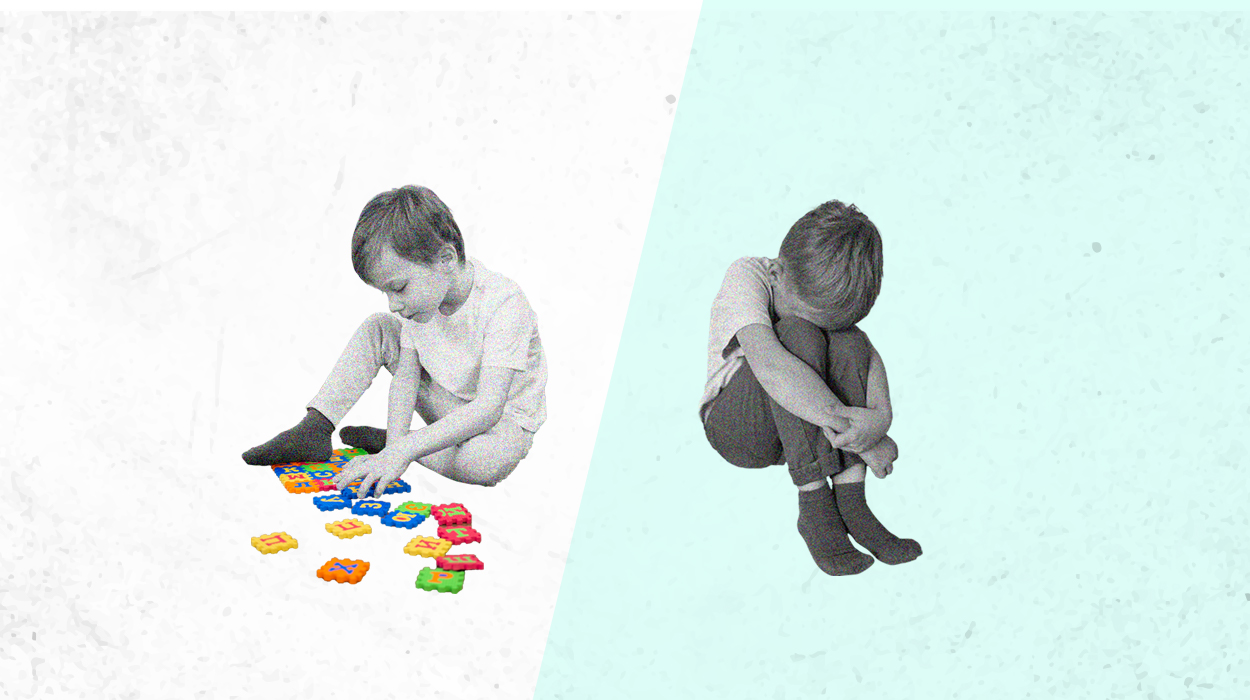 Expert's opinion
Expert's opinion
Expert's opinion
The article is a subjective view on this topic written by writers specializing in medical writing.
It may reflect on a personal journey surrounding struggles with an illness or medical condition, involve product comparisons, diet considerations, or other health-related opinions.
Although the view is entirely that of the writer, it is based on academic experiences and scientific research they have conducted; it is fact-checked by a team of degreed medical experts, and validated by sources attached to the article.
The numbers in parenthesis (1,2,3) will take you to clickable links to related scientific papers.
Autism & Bipolar: Symptoms, Similarities, Differences & Treatment

Bipolar disorder (BD) and Autism spectrum disorder (ASD) are two different conditions that affect an individual’s life differently. BD is classified as a mental health illness, while ASD is a neurodevelopmental condition. That being said, they possess distinct characteristics that may occasionally exhibit overlap.
Bipolar disorder, formerly called manic depression, is characterized by severe mood swings[1], and rapid changes in energy levels, and functioning. Whereas Autism is characterized by impairments in communication, social skills, and behavior.
Can these two conditions co-exist? Can individuals with ASD have similar experiences as individuals with bipolar disorder? How can you differentiate between the two conditions? In this article, we will answer all these questions along with the symptoms, similarities, and differences between the two conditions.
Is There A Connection Between Autism And Bipolar Disorder?
Some symptoms of bipolar disorder overlap with ASD but is there a real connection between the two? Research indicates that these two brain conditions share some gene expression patterns[2. But the presence of both conditions together is not prevalent. According to one study[3, a significant minority of ASD patients also suffer from bipolar affective disorder.
So, the co-existence of the two conditions is possible but it doesn’t indicate that a person with ASD will also have bipolar disorder or vice versa. The similarity between the symptoms of the two conditions might make it difficult to diagnose and differentiate one from the other particularly if BD is apparent from childhood.
Is There A Connection Between Autism And Bipolar Disorder?
Some symptoms of bipolar disorder overlap with ASD but is there a real connection between the two? Research indicates that these two brain conditions share some gene expression patterns[2]. But the presence of both conditions together is not prevalent. According to one study[3], a significant minority of ASD patients also suffer from bipolar affective disorder.
So, the co-existence of the two conditions is possible but it doesn’t indicate that a person with ASD will also have bipolar disorder or vice versa. The similarity between the symptoms of the two conditions might make it difficult to diagnose and differentiate one from the other particularly if BD is apparent from childhood.
Generally, red flags for autistic traits are evident in the child before the appearance of bipolar disorder. In the case of pediatric bipolar disorder, the symptoms may become evident as early as 5 years of age[4] of the child.
That said, one study found, that as much as 30% of youth[5] with bipolar disorder also had ASD. Interestingly, BD appeared earlier in the presence of ASD comorbidity.
One gene sequencing study[6] of bipolar disorder identified significant associations between the genes of autism and bipolar disorder indicating a genetic overlap that might also support the overlapping of the symptoms of the two conditions. Autism shares brain signature with both schizophrenia and bipolar disorder[7].
The latest findings on the co-occurrence of the two conditions are disparate and demand more research to arrive at any conclusion.
Bipolar Disorder: Symptoms

Unusual mood and behavioral shifts that severely impact day-to-day life is the primary characteristic of bipolar disorder. It includes periods of extreme happiness, overexcitement, or overjoy termed as ‘manic or depressive episodes’ followed by periods of extreme hopelessness, sadness, and depression.
The symptoms are much more severe than the normal ups and downs in the mood[8] everyone goes through and can be easily distinguished by the sheer intensity of the episodes. Often, bipolar disorder appears during teenage or early adulthood but it might appear during early childhood as well.
The word ‘bipolar’ means two opposite poles because a person suffering from bipolar disorder experiences both poles – the high experienced as ‘mania’ and the low experienced as ‘severe depression’ within minimum time.
Symptoms Of A Typical Manic Episode
- Talking very fast
- Changing topics quickly
- Behaving impulsively
- Distracted and restless behavior
- Sleeping very little or not sleeping at all
- Over-energetic activity
Typical Symptoms Of A Depressive Episode
- Feeling tired or low all the time
- Sleeping a lot
- An abrupt change in eating habits
- Irritability
- An intense feeling of hopelessness
- Suicidal thoughts and tendencies
Autism Spectrum Disorders: Symptoms

Autism, on the other hand, is characterized by common symptoms like problems in social interaction, communication, inability to understand others’ feelings, jokes or sarcasm, compulsiveness in following a routine, hyperactivity, impulsivity, aggression, and temper tantrums[9].
However, the severity of these symptoms varies considerably from person to person. Autism Spectrum Disorder covers a wide range of disorders under its umbrella and some symptoms can be specifically more or less intense, subdued, or prominent in an individual.
It is a developmental brain disorder and the symptoms are often evident by 1-3 years of age of the child.
Similarities And Differences Between Autism And Bipolar Disorder
The overlapping symptoms that are generally present in people with bipolar disorder and also in people with ASDs include,
- Frequent episodes of elevated mood
- High irritability
- Excessive activity
- Disturbed sleep
- Repetitive behavior
- Distractibility, and impulsivity
However, if a person with ASD shows all or a few of the above symptoms it does not necessarily mean that the person also has bipolar disorder. Not surprisingly, the symptoms of bipolar disorder in an autistic person will appear much different than they would in a person not with ASD. If a person has both conditions, the following symptoms are most likely to be noticed,
- Pressured speech is defined as loud, rapid, and virtually nonstop speech
- Increased impulsivity leading to aggression
- An abrupt decrease in sleep
- Constant pacing
It is challenging to diagnose psychiatric disorders in children or adults having some kind of speech or communication difficulties – which is the case with autism. According to the doctors working in this field, bipolar disorder is often over-diagnosed in people with autism[10] as individuals with the condition find it difficult to understand the questions and express themselves properly.
The doctors found the symptoms of a person with true bipolar disorder can be distinguished from an autistic person by carefully observing when the symptoms appeared and how long they lasted. If the presence of one symptom is evident, it is suggested to look out for the other symptoms before making the final diagnosis.
Bipolar Disorder – Cause And Treatment
The exact cause of bipolar disorder is not known but there can be several related factors triggering the condition. According to experts, it may be caused due to some underlying problem in specific brain circuits and the functioning of the neurotransmitters[11].
Classical genetic research indicates there is a strong contribution of genetic factors[12] which are often inherited. Having a first-degree relative, a parent, or a sibling with the condition significantly increases the risk of the disorder.
Treatment
Antipsychotic drugs are used to treat the ‘mania episodes’ but their effectiveness in treating depression is variable. Antidepressants are widely used to manage ‘depressive episodes’ but their effectiveness and side effects remain uncertain and controversial. A combination of medication and psychosocial intervention[13] can be effective for long-term maintenance and stabilization.
Autism Spectrum Disorder – Cause And Treatment
Both genetics and environment are supposed to play a role in the development of ASD. A number of genes associated with the condition have been identified. Research suggests that ASD could be a result of disruption of normal brain growth[14]very early in development. These disruptions might be caused by genetic factors.
Environmental factors may also play a role but no specific cause has been identified yet. Research shows the risk of autism is higher in prematurely born children. Having an elder sibling with autism and exposure of the mother to cigarette smoke during pregnancy have also been linked to an increased risk of autism in the child.
Treatment
Therapies and behavioral interventions designed to address the specific symptoms of the individual are effective for long-term management of the condition but there is no cure. Early educational intervention has been found effective in most cases. Mood stabilizing medications can be used for treating a person’s symptoms like anxiety and depression.
Conclusion
Both the conditions, bipolar disorder, and autism are brain disorders and have some overlapping symptoms. The two diseases have been found to share some particular brain signatures, so the relation is evident. Comorbid occurrence of the two conditions is not rare but that doesn’t mean an individual with ASD will also have bipolar disorder or vice versa.
The exact causes for both these disorders are still not known but there are some risk factors that might contribute to the occurrence – genetics being one of the most important factors for both. However, as the symptoms of bipolar disorder are often expressed ‘differently’ in a person with ASD, it is important to conduct the diagnosis depending on multiple factors after long-term observation.
+ 14 sources
Health Canal avoids using tertiary references. We have strict sourcing guidelines and rely on peer-reviewed studies, academic researches from medical associations and institutions. To ensure the accuracy of articles in Health Canal, you can read more about the editorial process here
- National Institute of Mental Health (NIMH). (2023). Bipolar Disorder. [online] Available at: https://www.nimh.nih.gov/health/topics/bipolar-disorder
- Science. (2018). Shared molecular neuropathology across major psychiatric disorders parallels polygenic overlap. [online] Available at: https://www.science.org/doi/10.1126/science.aad6469
- Skokauskas, N. and Frodl, T. (2015). Overlap between Autism Spectrum Disorder and Bipolar Affective Disorder. [online] 48(4), pp.209–216. doi:https://doi.org/10.1159/000435787
- Childrenshospital.org. (2023). Boston Children’s Hospital. [online] Available at: https://www.childrenshospital.org/conditions/bipolar-disorder#symptoms-and-causes
- Joshi, G., Biederman, J., Petty, C.R., Goldin, R.L., Furtak, S.L. and Wozniak, J. (2013). Examining the Comorbidity of Bipolar Disorder and Autism Spectrum Disorders. [online] 74(06), pp.578–586. doi:https://doi.org/10.4088/jcp.12m07392.
- Jamanetwork.com. (2023). Available at: https://jamanetwork.com/journals/jamapsychiatry/fullarticle/2517516.
- Nicholette Zeliadt (2018). Autism shares brain signature with schizophrenia, bipolar disorder. [online] Spectrum | Autism Research News. Available at: https://www.spectrumnews.org/news/autism-shares-brain-signature-schizophrenia-bipolar-disorder/
- Marvel, C.L. and Paradiso, S. (2004). Cognitive and neurological impairment in mood disorders. [online] 27(1), pp.19–36. doi:https://doi.org/10.1016/s0193-953x(03)00106-0.
- CDC (2023). Signs and Symptoms of Autism Spectrum Disorders. [online] Centers for Disease Control and Prevention. Available at: https://www.cdc.gov/ncbddd/autism/signs.html.
- Autism Speaks. (2023). Autism and Bipolar Disorder | Autism Speaks. [online] Available at: https://www.autismspeaks.org/expert-opinion/autism-bipolar-connection
- Manji, H.K., Quiroz, J.A., Payne, J.L., Singh, J., Lopes, B.P., Viegas, J.S. and Zarate, C.A. (2003). The underlying neurobiology of bipolar disorder. World psychiatry : official journal of the World Psychiatric Association (WPA), [online] 2(3), pp.136–46. Available at: https://www.ncbi.nlm.nih.gov/pmc/articles/PMC1525098/
- Letizia Squarcina, Fagnani, C., Bellani, M., Altamura, C. and Brambilla, P. (2016). Twin studies for the investigation of the relationships between genetic factors and brain abnormalities in bipolar disorder. [online] 25(6), pp.515–520. doi:https://doi.org/10.1017/s2045796016000615.
- Geddes, J.R. and Miklowitz, D.J. (2013). Treatment of bipolar disorder. [online] 381(9878), pp.1672–1682. doi:https://doi.org/10.1016/s0140-6736(13)60857-0.
- Yang, C.-C., Hark Hoe Tan and Du, Y.W. (2014). The developmental disruptions of serotonin signaling may involved in autism during early brain development. [online] 267, pp.1–10. doi:https://doi.org/10.1016/j.neuroscience.2014.02.021.



